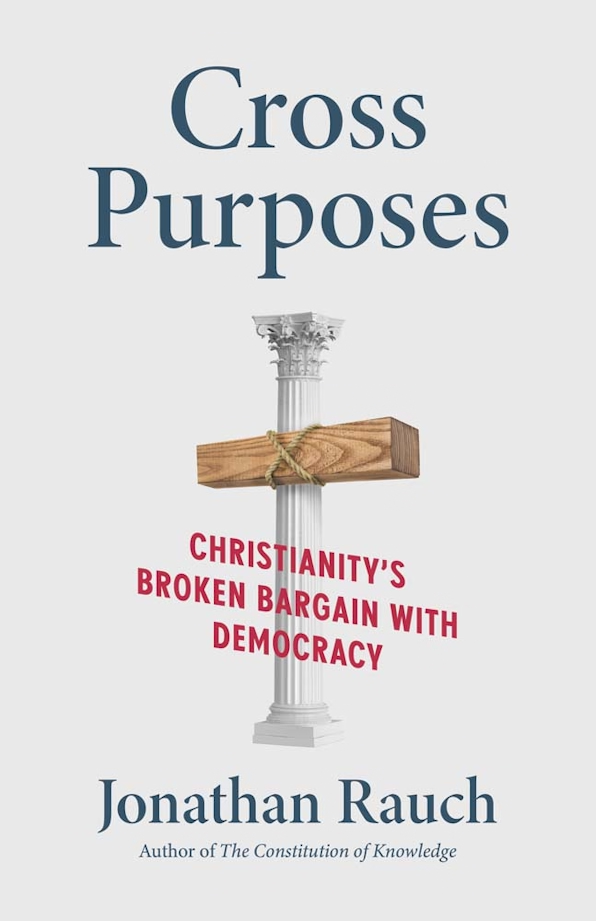I have previously mentioned the new book by the Brookings Institution scholar, Jonathan Rauch. It is Cross Purposes: Christianity’s Broken Bargain with Democracy.

It is such an interesting book, in no small part because it comes from a scholar who isn’t himself religious, but has repented, if you will, of his own onetime contempt for religion and Christianity in particular. Rauch now sees Christianity, particular in the historic Protestant varieties that dominated America at its founding, as having been a “load-bearing wall” for American life and democracy. Now that load-bearing wall has pretty much collapsed, leaving us harsher and meaner place and people.
In the course of his presentation Rauch says that this once load-bearing wall has morphed, over the last 50 years, into three types of Christianity in America. These are the “thin,” the “sharp,” and the “thick.”
The “thin” is his term for my crowd, mainline Protestants, i.e. the Methodists, Episcopals, Presbyterians, Congregational/UCC, Disciples of Christ, American Baptists, and Lutherans of the ELCA variety. Why thin? Because these churches so embraced mainstream American culture that you really couldn’t see much difference between the church and Rotary. (Except Rotary does require its members to actually show up at meetings.)
We blended in. The goal wasn’t to make better followers of Jesus so much as to make good citizens of the community. In the late 1960s, most began to tilt left, some more than others. “Social justice” was more apt to be the agenda than Christian witness. Ancient creeds gathered dust, to be replaced by the new creeds of “inclusion” and “diversity.”
As social expectations to be a part of a church evaporated, so did a lot of the members of such congregations. “I can worship God on the golf course, or on a hike,” said many. Others said, “If it’s only about being a good person, who needs church for that?” Alas, they weren’t wrong. There wasn’t enough there there, to adapt Gertrude Stein’s tart phrase about Oakland.
“Sharp” in Rauch’s terminology doesn’t mean intellectually acute. It means, churches that are mostly animated by fear — fear that they were losing their culture, their country, their dominance. While their fears were not entirely unfounded, such churches became “sharp,” angry and defensive, appealing to fear more than hope. When the GOP and Trump offered them the same deal that Satan offered Jesus, “all the kingdoms of the world, if you fall down and worship me,” the sharpies, unlike Jesus, took the devil’s bargain and went all political and full MAGA. Which has led, of late, to a lot of their members looking for the exit.
Which brings us to “thick.” It means something more odd and demanding than thin Christianity’s embrace of mainstream America, but not the sharp elbows and fearful posture of the religious right and MAGA. Thick means paying more attention to Jesus than to a political leader. It means a willingness to be different, to make sacrifices for your faith, and to practice a faith that is itself a thick culture of rituals, practices, and virtues that sets you apart from wherever America’s fractious and empty culture is going. One of the reasons for the rising popularity of the Eastern Orthodox church and faith in America these days is that it is a “thick” culture, very thick.
Next week, I’ll be giving a talk at the annual conference of Mockingbird Ministries in New York City. My talk is titled, “Isn’t Christianity Really Just About Being Good?” My ministry has mostly been about trying to nudge the thin mainline Protestantism in which I was reared, into something thicker and, I thought, more interesting.
Rauch, who incidentally is gay, an atheist, and a non-religious Jew, calls his book an “apology.” It’s an apology from one of the “cultured despisers of religion” who has come to feel that his former views are arrogant and stupid. But it’s not only an apology, it’s a challenge. In particular a challenge to Christians.
Rauch wants Christians, who have been either thin or sharp, to be more, not less, Christian. He wants us to be more like the one we call “Lord and Savior.” He wants this because he thinks America, in order to survive as a democratic republic and pluralistic society, really needs the Christians to be better Christians. I couldn’t agree more.
Discover more from Post Alley
Subscribe to get the latest posts sent to your email.
